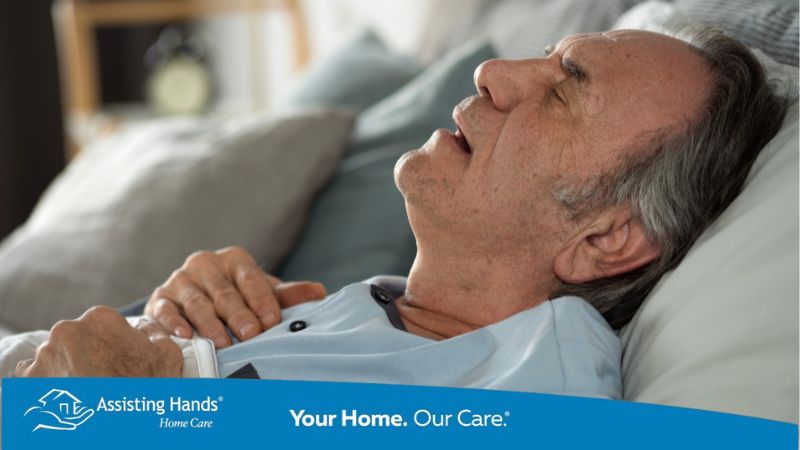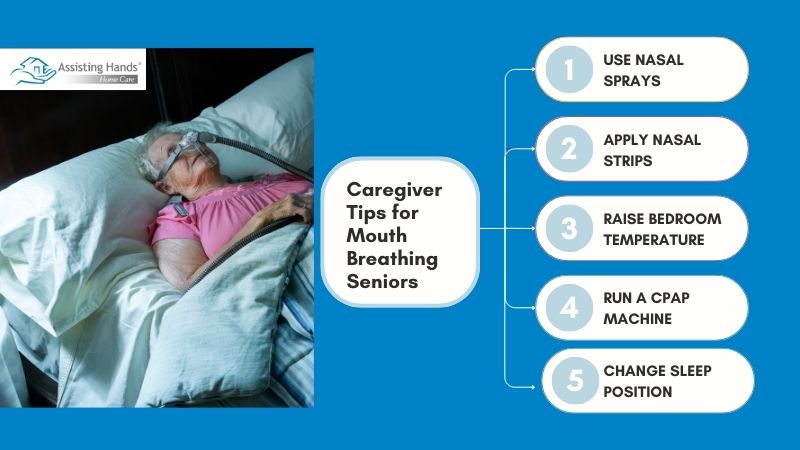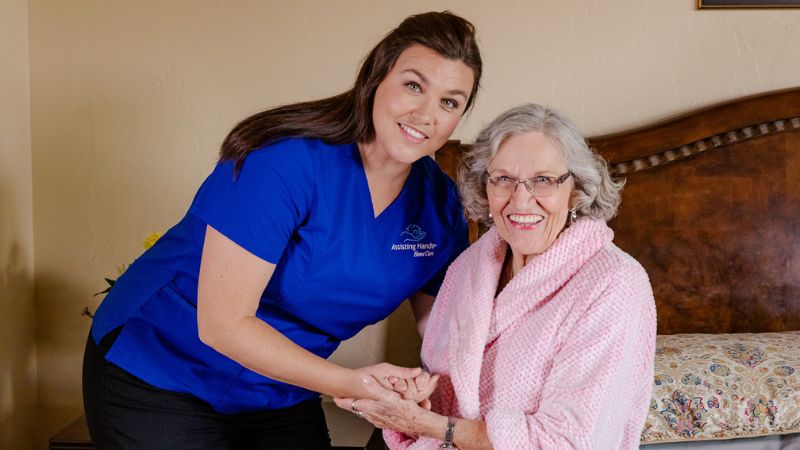

Key Takeaways: Many older adults sleep with their mouths open due to nasal congestion, age-related structural changes, or conditions like sleep apnea. While it may seem harmless, mouth breathing can lead to dry mouth, poor oral health, and restless sleep. Caregivers can help seniors improve their breathing habits with simple solutions like nasal sprays, CPAP machines, and adjusting sleep positions.
Older adults may sleep with their mouth open due to a variety of age-related factors. Sleeping in this way is not normal. In fact, it may suggest an underlying health condition. Here’s five ways caregivers can help their elderly care recipients who sleep with their mouth open.
Why do Elderly Sleep with their Mouth Open?
When a condition or obstruction interferes with normal breathing, an older person may resort to sleeping with their mouth open. A common cause of obstruction is nasal congestion. This condition may be temporary, such as when the senior develops a cold, allergy, or asthma symptoms.
Older adults are more prone to sinus congestion, due to nasal structural changes, decreased blood circulation to the nasal lining, and reduced mucus production. These age-related changes contribute to nasal congestion and, as a result, breathing with the mouth open.
Physical changes to the nose also occur with age and make it difficult to breathe through it during sleep. For example, the tissue in the nose and throat becomes less firm as seniors age. The resulting narrower airway makes breathing through the nose more problematic.
Other anatomical changes to the nose also cause seniors to resort to mouth breathing at night. A deviated septum of the nose occurs when the wall dividing the two nostrils bends or becomes crooked, causing blockage in one nostril and the resulting mouth breathing.
Sleep apnea is a common cause of mouth breathing, too. This sleep disorder causes the airways to collapse repeatedly during sleep. Aging adults with this disorder consequently open their mouths to gasp for breath, continuing throughout the night to sleep with their mouth open.
What are the Symptoms of Mouth Breathing?
As mentioned, mouth breathing during sleep is not normal and can result in several health symptoms. The elderly experience dry mouth, hoarseness, bad breath, or a sore throat upon waking up. Morning headaches are also common after nighttime mouth breathing.
Poor oral health is a consequence of sleeping with the mouth open; tooth decay and periodontal disease can occur. The decreased saliva production that occurs with mouth breathing creates dry conditions inside the mouth, whereby bacteria thrive, and oral health issues develop.
Related Read: How Often Should Seniors Have Dental X Rays?
Seniors who sleep with their mouth open may not feel well rested in the morning. In fact, they may notice they are sleep deprived. Poor quality sleep leads to several health repercussions, such as an increased risk for high blood pressure, diabetes, depression, and stroke, among others.
How do Caregivers Help Seniors who Resort to Mouth Breathing?
Fortunately, caregivers can prevent these health conditions by providing their aging care recipients with home remedies for mouth breathing. Prior to starting any of these tips, it’s advised the senior keep track of their sleep habits in a journal or sleep tracker to determine if progress is being made.

1. Use Nasal Sprays
If nasal congestion is the cause of mouth breathing, seniors should use a saline spray or a saline nasal wash to clear the congestion. Avoid using nasal sprays regularly, as they can worsen the congestion. Home remedies include applying a warm compress to the sinuses to relieve pressure.
2. Apply Nasal Strips
Nasal strips are simply strips that are applied over the bridge of the nose. They work to relieve difficulty breathing through the nose by pulling the nostrils outward. However, this method of opening the nasal passageways is not shown to be effective for everyone.
3. Raise Bedroom Temperature
A bedroom that is dry and chilly is likely to give the senior a runny nose and, therefore, cause nasal congestion and mouth breathing. Although a cooler environment promotes sleep, it’s recommended to keep the temperature between 68- and 77-degrees Fahrenheit to prevent mouth breathing.
4. Run a CPAP Machine
A continuous positive airway pressure (CPAP) machine may be helpful for older adults diagnosed with sleep apnea. The machine delivers a stream of pressurized air to the nose and mouth via a mask to open up the airways. However, these devices are pricey and require a prescription.
5. Change Sleep Position
Seniors are less likely to sleep with their mouths open when they lie on their side or in an upright position, as they help open the airways. Elderly individuals can ensure they sleep in the best position with the help of supportive pillows or body position sensors with alarms.
If mouth breathing persists despite treatment, the senior may wish to speak with a sleep specialist or a doctor. A sleep study may be conducted to determine the underlying cause of the problem and optimal solutions. For example, surgery is beneficial to remove enlarged tonsils causing the mouth breathing.
Nasal breathing is recommended, as it leads to a healthier immune system. The nitric oxide produced during nasal breathing helps fight infections. Breathing through the nose filters out dust particles and allergens. Nasal secretions also combat viruses and bacteria that try to enter through the nose.
Overnight Care from Assisting Hands
Seniors who breathe through their mouths while sleeping benefit from the support of an overnight caregiver from Assisting Hands Home Care. Our compassionate professionals remain awake at night to ensure the elderly sleep in an optimal position and reverse their mouth breathing.

We’re alert when the senior needs help getting up and using the bathroom. Caregivers provide respectful help with all hygiene tasks, including toileting and dressing. The mobility support we offer ensures the older individual does not fall on their way to the restroom.
If the senior prefers to visit a doctor or sleep specialist, we provide safe transportation and escort to the medical facility. Overnight home care includes medication reminders, healthy meal preparation, light housekeeping, and companionship to deter feelings of loneliness and social isolation.
Quality overnight care from Assisting Hands Home Care is the solution for seniors who sleep with their mouth open. Our attentiveness throughout the night promotes comfort, health, and safety. Schedule a free in-home consult at our Palos Heights, IL, location to see how senior home care improves sleep.
